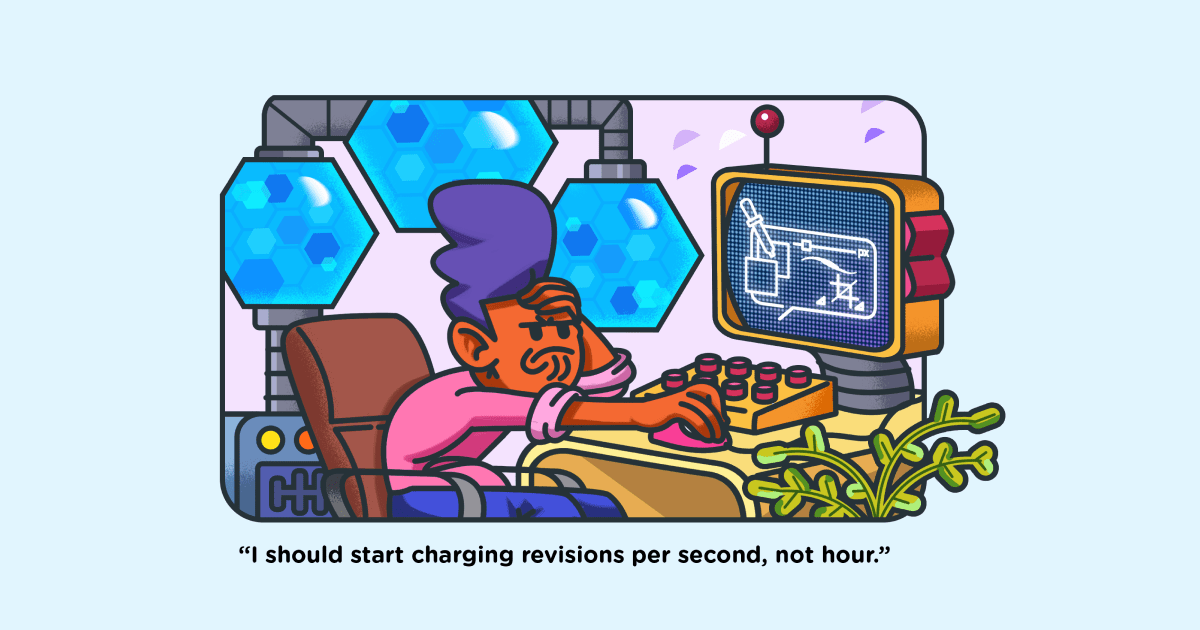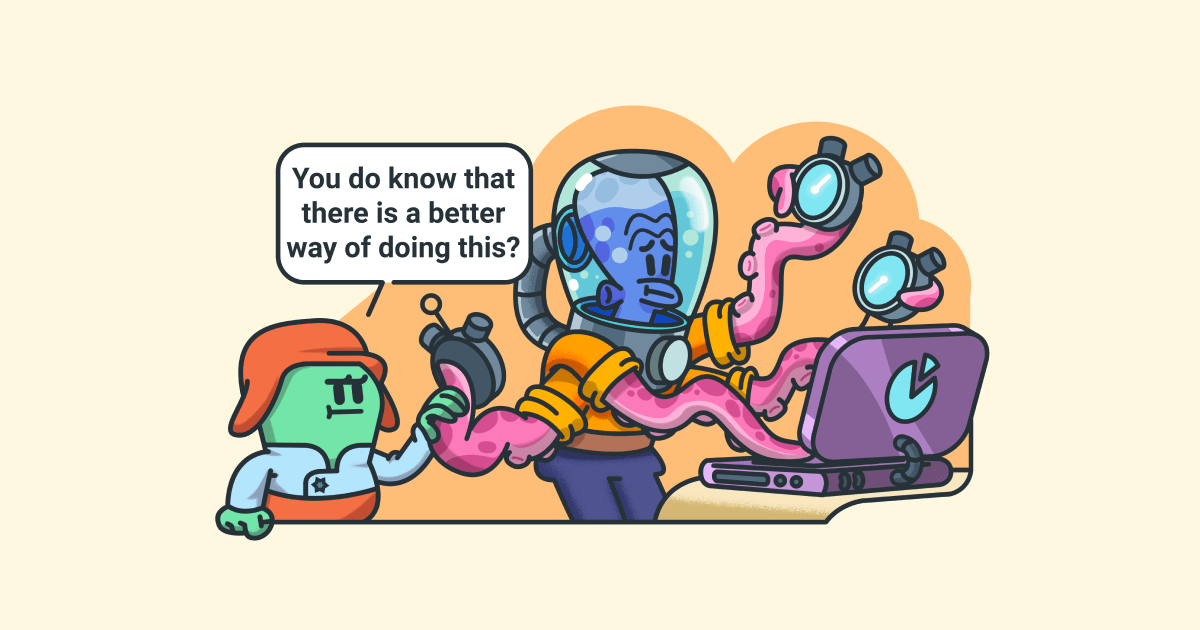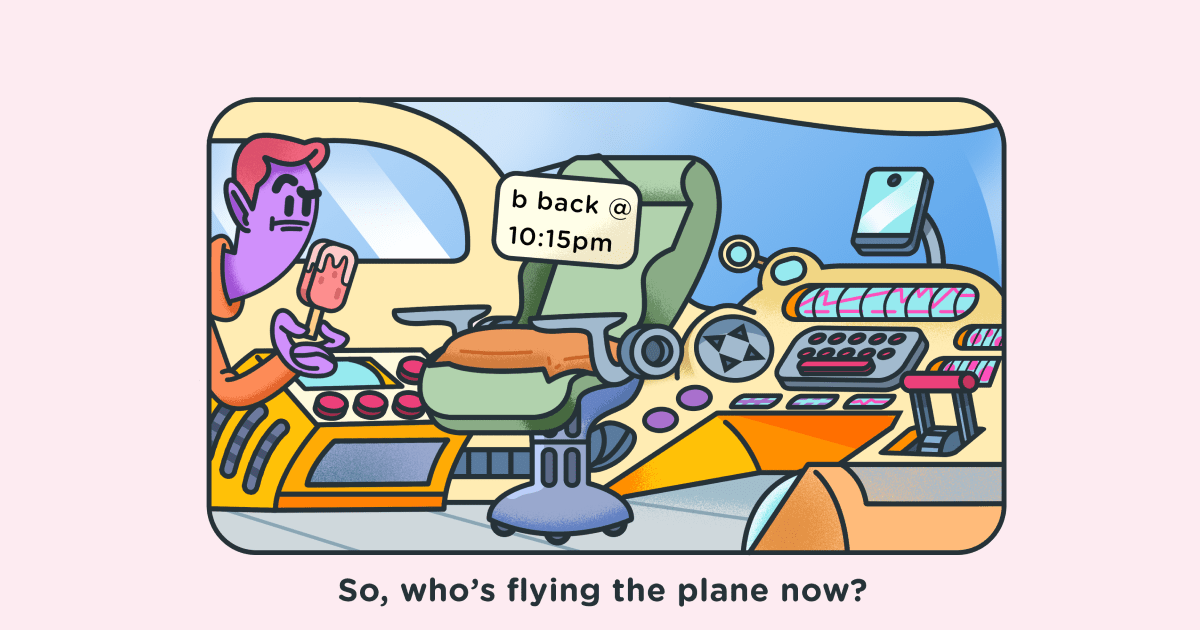How personal timekeeping helps you stay on top of things
Last updated on: May 5, 2023
Keeping track of your personal projects and achieving personal goals can be as hard and as time-consuming as work; it often requires the same level of dedication.
To be able to accomplish everything, you need good time management and organizational skills. Timekeeping is a good option to make the whole process go smoother.
In this article, we’ll go over everything you need to know about personal timekeeping – what it is, why it’s important, and how to track personal time.

Table of Contents
What is timekeeping?
According to the dictionary, timekeeping means “recording time, keeping track of the hours worked by the employees.”
Timekeeping is the most frequently used in the business world, because, as the famous saying goes, “time is money”. Businesses and freelancers track their working hours so they can bill accurately, be transparent, plan projects easier, optimize work processes, and improve work management.
A (very) brief history of timekeeping
Humans have been trying to track time since the dawn of civilization.
One of the very first tools were shadow clocks. They consisted of a stick placed upright in the ground that formed a shadow and markers along the shadow’s path that divided a day into segments.
Even in ancient societies, it was important to measure time so the workers could be paid accurately. Fun fact: according to this article from DailyMail, since the economy was based on the redistribution of goods, workers from Mesopotamia and Egypt were getting beer as a paycheck, among other food.
Since sundials are useless when the sun is not shining, we needed something different; the technology progressed to mechanical devices (water clocks, candle clocks, and hourglass, among others). In the 17th century, it advanced even more, when pendulum clocks were invented. Still, the Earth’s rotation was the most important “clock”.
Timekeeping technologies further evolved after the Industrial Revolution, as the relationship between an employer and employees started being defined by the good, old “time is money” principle we’ve already mentioned.
The first clock for tracking attendance is believed to be the one created in 1888 by Willard Le Grand Bundy, a jeweler from New York. His patent speaks of mechanical time recorders for workers in a way that implied that earlier recorders had already existed; however, he made some improvements, such as each employee having their own key.
A year later, those clocks started being mass-produced. However, like the rest of the technology of that time, they were bulky and complicated to use.
Nowadays, everything is done digitally and technology is advanced enough that even if you’re not a business, you can track your time for your own personal projects and goals, fast and easily.
Why is timekeeping important?
Here are the most important benefits of timekeeping, as well as why you should consider incorporating it in your day-to-day life and when working on your personal projects.
How timekeeping enhances your productivity
One of the biggest advantages of time tracking is that it improves your productivity. Here’s how:
The psychological way it improves productivity
Have you ever heard of the Hawthorne effect?
Hawthorne effect is a term referring to the tendency to work harder and perform better when you know you’re being observed and/or evaluated.
It was named after the research conducted at the Hawthorne Western Electric Plant (hence the name) in Illinois, USA in the 1920s.
It was originally conducted to study the effect of lighting on workers’ productivity. When the lighting improved, so did the productivity. However, productivity improved again when the lighting was diminished, even though it was expected to worsen. Researchers were perplexed.
Workers’ productivity improved whenever work conditions changed (for better or for worse), whether it was the lighting, working hours, or rest breaks.
It turned out that it wasn’t the variables of the work environment that changed the behavior, but the fact that they were being observed. According to many, the Hawthorne effect is unavoidable in research and studies that use humans as subjects.
Now, how can that help you and your productivity?
There won’t be a mysterious Big brother entity watching and evaluating you when you start timekeeping, don’t worry. Our brains work in a way that when we know what we do is being measured, we subconsciously try harder and consequently, perform better. Use our innate psychological quirk to your advantage: measure your own time.
The practical way it improves productivity
Procrastination is often the biggest nemesis of productivity, and tracking time can help with that.
Seeing a timer running i.e. having a visual representation of every passing second will prevent you from wasting valuable moments – it will encourage you to tackle the task right away. Also, knowing that if you scroll through Instagram for an hour, you’ll have to write it down, makes it a bit easier to resist the urge to go to social media.
Or, as we keep telling ourselves, “I’ll just check my social media for a minute and then go right back to work.”
💡 Clockify Pro Tip
For a detailed advice on how to overcome procrastination, check out the following guide:
Another problem is multitasking: even though you aim to get more done in less time, you end up losing focus and actually accomplishing less.
When using time tracking apps, you can’t put two entries at the same time, which forces you to focus on one task at a time. Doing tasks one by one makes you more efficient. When you switch from one task to another, your brain needs some time to get used to a different way of thinking, which makes you lose concentration and you become less productive.
You get things done faster and better when you don’t multitask.
Nikolas Baron, who worked as an SEO Manager and Growth Advisor for companies such as Grammarly, Ticketmaster, and Honey, said in the article published by inc.com:
“Rather than answering a call, checking email, and then moving back and forth between several tasks that I have in progress, time tracking actually encourages me to focus on one activity for an extended period of time to improve my focus and productivity. Also, time tracking is a great way to remind me to get up and move around every 50 minutes to clear my head and refresh my perspective.”
Quality of life is improved
When you start tracking your time, you will have access to data that shows you how exactly you spend it. You may face a painful realization that you waste way too much time on things that don’t really matter. As unpleasant as it initially is, you can use that as an opportunity to make a change and start spending more time on the things that you value.
What do you spend too much time on? What do you not spend enough time on? Does your schedule reflect your values and the goals you’re trying to achieve? If not, what can you change?
If you answer these questions and implement necessary changes, your quality of life will improve as you will put your time and energy into things that matter and that fulfill you.
Having a work-life balance
So far, we’ve talked about how timekeeping helps you:
- Know how much time each one of your tasks takes,
- Know what your priorities are,
- Identify non-essential and time-consuming tasks,
- Stay focused on your work,
- Minimize procrastination,
- Avoid multitasking.
All of those things get you on the right path to make a schedule that will allow you to have a healthy work-life balance. It allows you to organize better and make enough time for everything important, including health, sleep, and social life, not just working 24/7.
Additional tip when making a schedule: take into consideration the time of the day when you’re the most productive – for some people it may be early in the morning, and for others, late at night. If you adjust your schedule to your natural rhythm, you’ll be more focused and get things done faster. Work smarter, not harder!
How do I track personal time?
You decided that you want to start tracking your time, but you’re not sure how? It’s actually easier than you might think. None of the methods require more than a few simple steps.
Choose a timekeeping method
The first step is to choose a method. You can use pen and paper or a spreadsheet, but it’s the fastest and easiest to use time tracking software. Even within timekeeping software, there are different options you can choose from, according to your preferences.
Tracking time using a timer is simple and very useful if you want or need to be precise when tracking.
All you have to do is
- start a timer,
- indicate what project or task you are working on, and
- stop the timer when you finish working on that project.
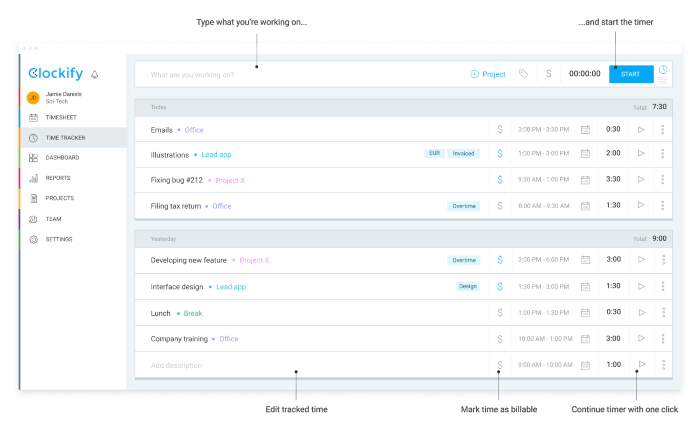
Timesheets are a quick way to add a lot of entries at once.
- Select a project you’re working on,
- Write how much you’ve worked on that task,
- Add a row for each task/project you’ve worked on that day.
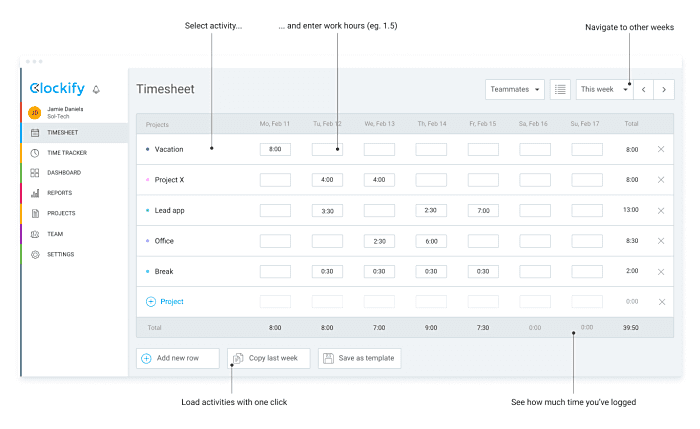
Manually time tracking is perfect for tracking all your tasks in one go. It lets you add time entries one by one, specify start and end times, and date.
An automatic time tracker is great if you want to track something that’s done on the computer. You don’t have to do anything, it automatically records the time you spend on computer activity. It’s the quickest method out of all, but it can’t be used for tasks and activities that are not digital.
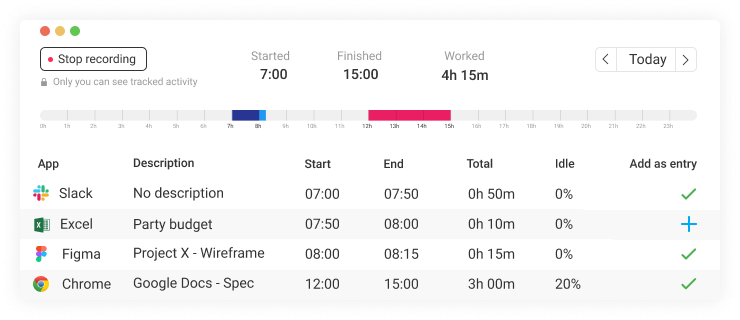
You can also use the time blocking technique using the calendar view if you’re a visual person. You define specific time blocks for the tasks, events, and activities in your life, and then add them to your calendar.
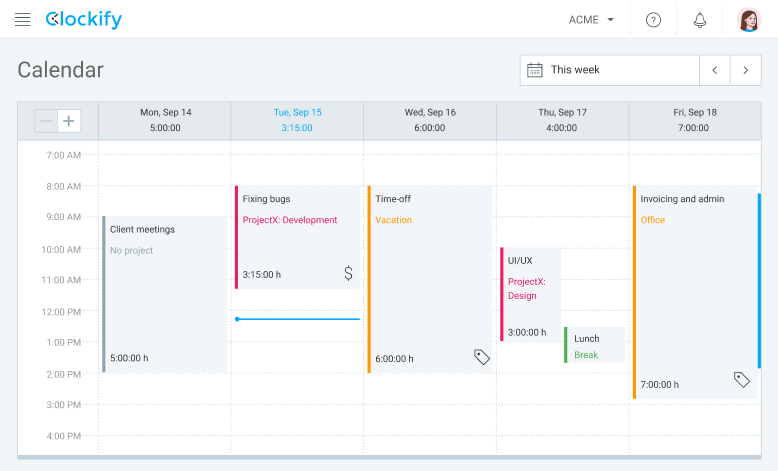
Do weekly reviews
Every week or so, check your dashboard and a detailed or weekly report on your time tracking app. This is important to do so you can evaluate how you spend your time and if you should make any changes in your schedule.
When you start timekeeping, you’ll naturally become more aware of where your time goes, but seeing all the data will help you get the full picture. It will make it easier to plan and see the flaws in your schedule, as well as the optimal way to improve it.
Conclusion
Timekeeping is a great practice to reach your personal goals for a variety of reasons, the most important being that it boosts your productivity and helps you spend your time on the things you value and that matter to you, thus improving your quality of life.
The easiest option is to get a time tracking app and use it in a way that works best for you, whether you decide to fill timesheets, record time, or use some other method.
Whichever one you choose, it will be a step forward to good time management and getting your personal projects done.
✉️Do you track your time? How has it helped you achieve your personal goals? What are your personal timekeeping tips? Tell us by writing us at blogfeedback@clockify.me.

